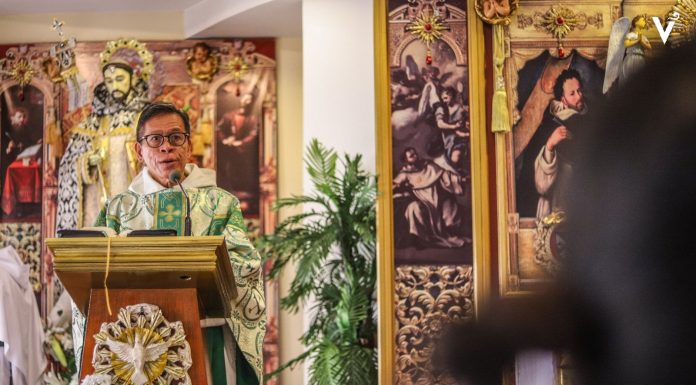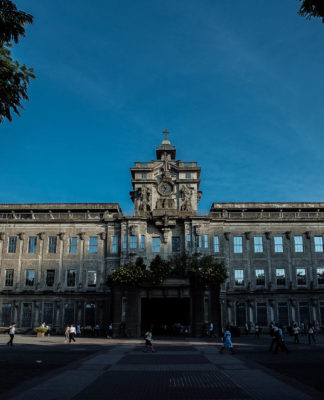YOUNG Thomasian evangelists are on the rise.
Thomasians had the most number of delegates out of 9,600 students, pastors and professionals in Ignite 2013, a three-day national conference organized by LifeBox Philippines—Every Nation Asia, a Christian youth organization, last May 29 to 31 at the Cuneta Astrodome, Pasay City.
Registration data showed that around 500 Thomasians attended the event and almost 1,500 Thomasians are now part of LifeBox.
Challenge to the youth
This year’s Ignite focused on challenging the youth to be “used” for God’s purpose. The gathering happens every two years.
Youth minister Edrei Canda said: “We have two choices to have a victorious life—to resolve to follow God or dissolve in what the world has to offer.”
Liane Silla, campus speaker from the University of the Philippines Los Baños, challenged participants to use everyday opportunities and influence in strengthening passion for God.
“Be up to the challenge of being used by God. God’s purpose is bigger than life, bigger than your fears, bigger than you, bigger than our anxieties,” Silla said.
Dan Monterde, director of LifeBox Central Luzon, also urged the youth to be disciples and to have disciples themselves.
“To make disciples, you just have to be a disciple. We will be the kind of people whom God will use to be evangelizers. It all starts by saying ‘yes’. Have an ambition that will make an impact on eternity. The motivation to make disciples is to honor God,” Monterde said.
Attending such evangelical activities is not exclusive to one’s religious affiliation. As long as one has passion for God, he is free to attend, Kristine Corona, UST LifeBox campus minister, said.
Thomasian evangelizers
The use of social media space in preaching the Word of God is becoming a trend, especially with the youth.
“Social networks are not only for status sharing. Since social networks are ‘in’ among the youth today, we also use social networks to engage with students. Once we engage them, we introduce the power, the Gospel,” said Corona.
But, Allan Basas, secretary of the Institute of Religion, said that despite the advantage of social media, the traditional way of spreading the gospel should still be practiced.
“They are just one of the many means that can be used to spread God’s word, but the traditional means like the sacraments and witnessing should not be changed,” he said.
One of the Thomasian “evangelizers” professed his commitment to spreading the Word of God.
Jacob Ayuste said the most important part of evangelizing is developing relationships.
“You can’t win someone’s life if you don’t have a relationship with him or her,” he said. “Discipleship is relationship.”
Ryan Tan, head pastor of Victory Christian Fellowship-University Belt, said discipleship is leading someone to follow Jesus and sharing the Gospel.
“It’s not about converting [other religions]. What we are pushing is that young people will have a relationship with Jesus,” Tan said.
Meanwhile, Justine Moya, Thomasian LifeBox worship leader, believes that Thomasian spirituality is firm.
“Firmness is the best word to describe Thomasian spirituality,” Moya said. “The way students engage with [spiritual] activities may change, but their spirituality and passion will always be there.”
Basas echoed Moya on Thomasian spirituality, emphasizing their active performance of religious beliefs.
“Thomasian spirituality is still firm. There are still religious activities to firm up their practice. Almost all students perform beliefs like attending Church Eucharist,” Basas said.
However, Tan said that young people’s interest in spirituality tends to decline.
“There are so many other distractions that can get their attention,” he said. “That is why we are helping young people have a renewal of faith and get connected to God.”
Learning from the differences
While UST is a Catholic university, it still respects religious freedom, Basas said.
“While we respect other religions, what we aim to promote is the Catholic doctrine and respect for our Catholic identity,” he said.
Other faiths in the University are not detrimental to students’ faith, he said. Other religions in the University also offer opportunities for young Catholics to know more and appreciate their religion.
“Variety and difference will allow us to appreciate more who we are because we are able to differentiate ourselves from other religions,” Basas said. “When you know the similarities and dissimilarities, you learn about others and at the same time, you learn [about] yourself.”
















I am a Thomasian who studied in the university during the 1980s. Yes, there were prayer meetings and evangelical Christian prayer groups sprouting inside the campus. Back then, the university administration were so firm about non-Catholics’ holding such gatherings on a frequently regular schedules in secrecy. The university’s stand then was, “As long as it is Catholic.” Ilaw ng Panginoon, a Catholic prayer group was popular then and we did it once a week at the Albertus Magnus Building hallway. That was UST’s answer to the Catholic Church’s concern about the growing number of Catholics mostly students getting converted to “Born Again Christian.” It’s now the new century. Things have changed I guess . . . for the better?